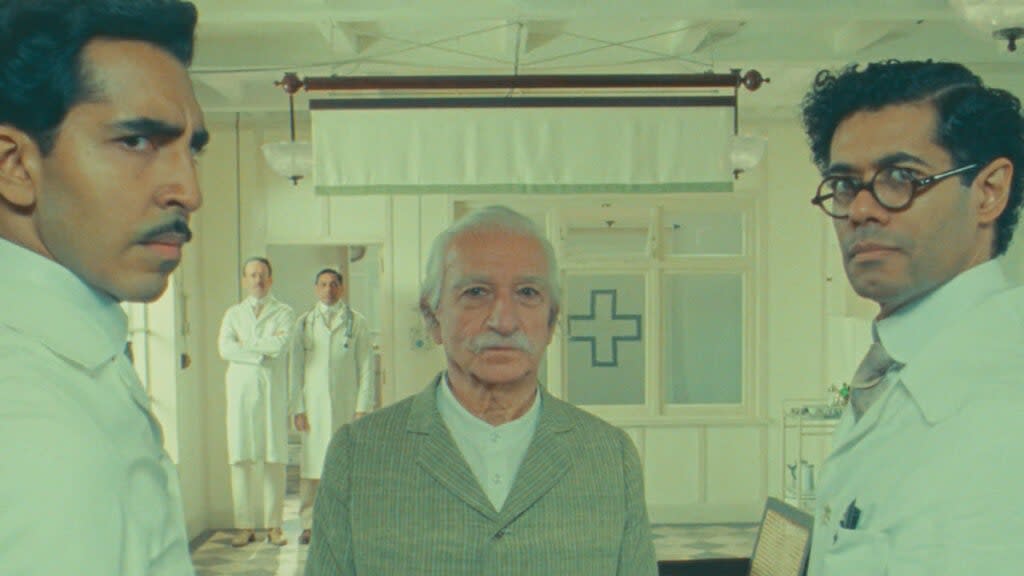‘The Wonderful World of Henry Sugar’ Review: Wes Anderson’s Dahl Adaptation Breaks Fresh Ground

Fresh off his trip to “Asteroid City,” Wes Anderson is already back on the festival grind, bringing a new vision to Venice that plays, surprisingly enough, like “Anderson: Unplugged.” Naked and vulnerable in all the ways this year’s previous effort was girded by walls of remove, “The Wonderful Story of Henry Sugar” points towards a new and earnest direction for the idiosyncratic filmmaker – and if you believe that, hear me out about a bridge in Brooklyn that’s calling your name.
So yes, Anderson’s “The Wonderful Story of Henry Sugar” does offer more of the same in a slightly smaller dose, promising the familiar delights of impeccable artifice and arch performers clearly having a ball, and giving Anderson-heads – of which I often count myself – something to look forward to once this 40-minute short hits Netflix later this month. But given the film’s abridged runtime and its genuine playfulness, even Wes-skeptics might find themselves cracking a wry grin from time to time.
To call the film a Roald Dahl adaptation feels almost imprecise, as “The Wonderful Story of Henry Sugar” is more of a full-on recitation, a filmed reading of Dahl’s 1976 short story that leaves no line unspoken. The author himself (played by Ralph Fiennes, in one of many roles) ushers us into this world. Seated at a recreation of his Gipsy House writing nook flattened and refined by Anderson’s symmetrical eye, Dahl looks squarely at the camera, addresses the viewer as an old friend, and begins spinning his tale about a loutish playboy with a taste for blackjack who goes by Henry Sugar.
Once invoked, Henry (Benedict Cumberbatch) soon takes the screen, taking over storytelling duties as a new backdrop is wheeled in behind him. As in “Rushmore” and large stretches of “Asteroid City,” Anderson once again emphasizes theatricality, going a step further here by staging the whole affair as an unbroken performance, with backdrops and sets swapped in “real-time.” As with “The Grand Budapest Hotel,” here is another nesting doll narrative, a story-within-a-story-within-a-story that flows from Dahl’s study to Sugar’s bachelor pad to an ashram in 19th century India and then loops back again.
Bored at a party one night, idle cardshark Henry Sugar soon discovers a medical text (enter new narrator Dev Patel, stage right) about a chance encounter between two doctors (Patel and Richard Ayoade, swapping the storytelling duties) and a circus performer (Ben Kingsley) with the peculiar ability to see with his eyes closed. Soon enough we’ve rewound a century, listening intently as Kingsley stares straight into the lens, relaying the secret yogic practice that affords him second sight.
As should go with saying, the parade of ever-changing theatrical sets and lighting design are far more detailed than anything you’ll find in summer stock – if anything, the ironic divide between the ostensible live performance and the painstaking precision of each composition becomes a winning running gag. As in the best stories, the delight is in the telling.
Returning to his London home with the blueprint for second-sight, Henry sets out to wrangle this mystical practice towards the more worldly concern of winning every hand. And after three years of devoted practice, he’s finally ready to hit the casinos – only the very act of becoming might have robbed him of his gambler’s taste.
Though Anderson has apparently thought about this project for nearly two decades, the film feels oddly reflective of the filmmaker’s current stature. Deep down, this wonderful story of Henry Sugar is that of a gambler who cannot lose, of a man who loses the taste for play when it comes without risk. Without psychoanalyzing Anderson too much (not like his aloof touch makes the task particularly easy), one cannot help but see the parallel.
Of all the filmmakers of his 1990s vintage, has anyone proved more durable, more prolific, more (shudder) memeable than our man from Texas? With actors still lining up to work with him and the cinema’s biggest festivals offering his work a home, the Anderson Express shows no signs of slowing (he has apparently already announced his next film), which makes it all the more interesting –and indeed, even revealing in a way – to explore the plight of man on top of the world, who looks around and asks, “Is that all there is?”
“The Wonderful World of Henry Sugar” opens in select theaters on Sept. 20 and hits Netflix on Sept. 27.
The post ‘The Wonderful World of Henry Sugar’ Review: Wes Anderson’s Dahl Adaptation Breaks Fresh Ground appeared first on TheWrap.


